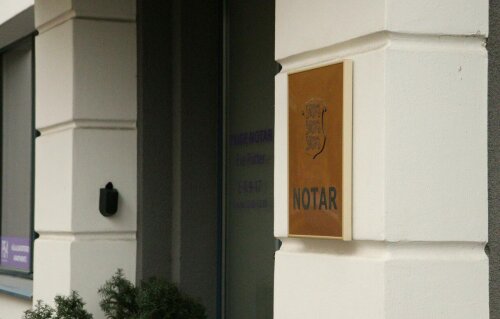Best Divorce & Separation Lawyers in Paide
Share your needs with us, get contacted by law firms.
Free. Takes 2 min.
Free Guide to Hiring a Family Lawyer
List of the best lawyers in Paide, Estonia
About Divorce & Separation Law in Paide, Estonia
Divorce and separation laws in Paide, Estonia are designed to end a marriage or registered partnership in a structured and lawful manner. The Estonian legal system provides procedures for both consensual (mutual agreement) and contested (disputed) divorces. Issues such as property division, child custody, spousal support, and child maintenance are typically addressed during the divorce process. The family courts in Estonia seek solutions that prioritize the well-being of children and aim for fair outcomes for both parties.
Why You May Need a Lawyer
While some divorces can be resolved amicably, legal assistance is often essential in more complex scenarios. Here are common reasons why individuals seek the help of a lawyer in divorce and separation cases:
- Disputes over child custody and visitation rights
- Disagreements about division of property and debts
- Issues related to spousal and child maintenance (alimony and child support)
- Concerns about the fairness of the divorce settlement
- One spouse is hiding assets or income
- Domestic violence or safety concerns
- Uncertainty regarding legal documentation and court procedures
- International aspects, such as foreign citizenship or assets abroad
Having a legal expert by your side ensures your rights are protected, you understand your obligations, and the process moves forward as smoothly as possible.
Local Laws Overview
In Paide, as in the rest of Estonia, divorce and separation are regulated under the Family Law Act and relevant civil procedure laws. Here are key aspects to consider:
- Married couples can obtain a divorce either in court or by notarial procedure if both parties agree.
- Court proceedings are necessary if there is disagreement regarding the divorce, property, custody, or other related matters.
- Estonian law requires the welfare of children to be prioritized, often resulting in joint custody unless circumstances require otherwise.
- Property acquired during marriage is generally considered joint property and is distributed equally, unless a prenuptial agreement states otherwise.
- Spousal support is not automatically granted and depends on several factors such as financial need and contribution during marriage.
- Child maintenance (support) is a legal obligation, calculated based on the child's needs and parental capacity to pay.
- Separation as such does not have a formal legal process in Estonia, but living apart can be relevant for subsequent divorce proceedings.
Frequently Asked Questions
How can I file for divorce in Paide, Estonia?
You can file for divorce through the court or via a notary if both spouses mutually agree to end the marriage and have settled all important matters, including child custody and property division.
Do I need to go to court for a divorce?
If both parties agree on all terms, a divorce can be finalized by a notary without court proceedings. Disputes require court involvement.
How is property divided after a divorce?
Marital property is usually divided equally between spouses, unless a prenuptial or postnuptial agreement dictates otherwise.
What happens to our children after a divorce?
The court prioritizes the best interests of the child, commonly granting joint custody unless there are compelling reasons to decide otherwise, such as risks to the child's safety or well-being.
Can I get alimony (spousal support)?
Spousal support is not automatic in Estonia. The court may award support based on financial need and the circumstances of the marriage and divorce.
What is child maintenance and how is it calculated?
Child maintenance is financial support from the non-custodial parent to help cover the costs of raising the child. The amount depends on the child's needs and the financial capacity of the parents.
How long does the divorce process take?
The duration varies based on the complexity of each case. Uncontested divorces through a notary can be relatively quick, often completed within a few weeks. Disputed cases in court may take several months or longer.
If my spouse and I live apart, is this considered separation?
Estonian law does not recognize formal legal separation, but living apart can be relevant, especially when determining periods of estrangement in contested divorce cases.
Do I need to hire a lawyer for divorce in Paide?
Legal representation is optional but often beneficial, particularly in contested cases, those involving significant assets, child custody disputes, or international elements.
Can foreign nationals get divorced in Paide, Estonia?
Yes, foreign nationals can divorce in Estonia, provided at least one spouse is an Estonian resident or citizen or if the marriage was registered in Estonia. Special rules may apply for international cases.
Additional Resources
If you need further information or help with divorce and separation in Paide, Estonia, consider reaching out to the following resources:
- Estonian Ministry of Justice - Offers legal information and guidelines on family law
- Estonian Bar Association - Provides a list of qualified family law attorneys and legal aid services
- Paide City Government - Local civil registry office for notarial divorce and other civil matters
- Social Insurance Board - For issues relating to child maintenance support and social rights
- Non-governmental organizations - Support services for victims of domestic violence and family counseling
Next Steps
If you believe you need legal assistance with divorce or separation in Paide, Estonia, here are steps you can follow:
- Assess your situation and determine if mutual agreement is possible with your spouse.
- Gather all necessary documents, such as marriage certificate, proof of residence, details about children, and information on marital property.
- Consider consulting with a local family law attorney experienced in Estonian divorce cases to evaluate your options and protect your interests.
- If applicable, contact the local notary office for an uncontested divorce. Otherwise, prepare to initiate proceedings with the court.
- Utilize available government and support resources, especially if children or sensitive issues are involved.
Seeking legal guidance early in the process can help avoid common pitfalls and ensure your rights and responsibilities are clearly defined, leading to a smoother divorce or separation process.
Lawzana helps you find the best lawyers and law firms in Paide through a curated and pre-screened list of qualified legal professionals. Our platform offers rankings and detailed profiles of attorneys and law firms, allowing you to compare based on practice areas, including Divorce & Separation, experience, and client feedback.
Each profile includes a description of the firm's areas of practice, client reviews, team members and partners, year of establishment, spoken languages, office locations, contact information, social media presence, and any published articles or resources. Most firms on our platform speak English and are experienced in both local and international legal matters.
Get a quote from top-rated law firms in Paide, Estonia — quickly, securely, and without unnecessary hassle.
Disclaimer:
The information provided on this page is for general informational purposes only and does not constitute legal advice. While we strive to ensure the accuracy and relevance of the content, legal information may change over time, and interpretations of the law can vary. You should always consult with a qualified legal professional for advice specific to your situation.
We disclaim all liability for actions taken or not taken based on the content of this page. If you believe any information is incorrect or outdated, please contact us, and we will review and update it where appropriate.









